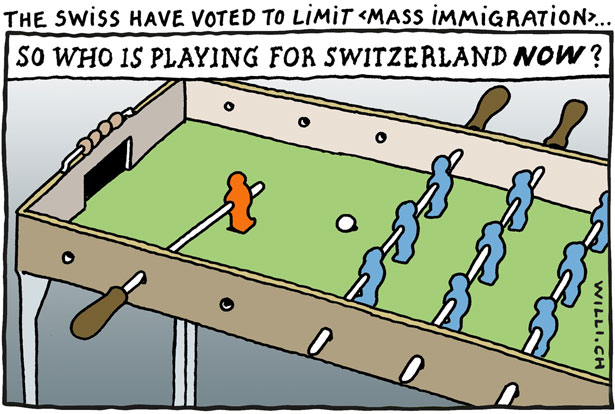February 9, 2014 is a day to remember in many more ways than one.
It is not an earthquake that hit something somewhere. It is not a flood that engulfed English villages (although that happened too) and it is not some major lottery win that would have astounded folks around Europe (although that also happened).
February 9, 2014, is a day of shame (for 49.7% of the voting public) or indeed a day of glorious victory (for the slim majority of the voters, i.e. 50.3%) for Switzerland. On Feburary 9, 2014, the Swiss held a referendum – they call it direct democracy – in their Alpine paradise. The objective made euroskeptics tick and right-wing freaks rejoice (as Le Pen demonstrated after the results were published): to limit – or cap, in football speak – the number of immigrants to this land of milk and honey (or bigotted and crooked bankers and opportunistic sycophants, as others would say). That was the motion at stake.
The proposition was a curious one – but then again, perhaps not – when one considers that the Swiss, who always strive to eat the cookie, marry the baker and buy the pastry shop at the same time, could not have created the wealth they have without the help foreigners who built their motorways and tunnels (Italians), who clean their dirty laundry and the restaurant kitchens (Tamils), who sweep their streets (anybody, as long as it is not the Swiss themselves), who care for their sick in the hospitals (Africans, Kosovars, Serbs and Croats to name a few), and who take care of their elderly in over-priced old people’s homes (Hungarians, Romanians, Czechs and Slowaks). And who lecture at their universities (any national with a proper IQ). But also, who deposited their honest or ill-gotten gains in Swiss banks.
Or, indeed, who play football for this nation of chosen people.
Frankly, there exists no Swiss national squad that could have qualified for the FIFA 2014 World Cup in Brazil, were it not for the likes of Kasami, a midfielder from Macedonia, Barnetta, midfielder from Italy, Xhaka, the top ranked midfielder from Kosovo, Dzemaili, midfielder from Macedonia, Bernaglio, “Switzerland’s” goalkeeper from Italy, Inler, the midfielder from Turkey, Senderos the defender with a Spanish father, Gavranovic, the striker from Croatia, Mehmedi, a striker from Macedonia, Drmic, another striker from Croatia, Seferovic, a striker from Bosnia-Hercegovina, Rodriguez, a defender from Spain, Fernandes, a Midfielder from the Cape Verde Islands and the two Kosovar midfielders Behrami and Shakiri, both stars in their own right.
Of the 23 players in the Swiss squad who were selected to make the trip to Brazil, nearly twice as many hail from another motherland than those lowly eight who have “real” Swiss family names (and play like that, too). The Swiss have a funny way of celebrating patriotism by elevating footballers to the level of national heroes – like just about anywhere else – except that in their case, these heroes hail from lands despised, defamed and mistreated by the majority of the Swiss (Kosovo, Serbia, Albania above all).
It takes some nerve to conduct oneself the way the Swiss do – and get away with it. You should have seen the national joy that erupted on all networks when young Yuri Podladtchikov, Russian by any account, won a gold medal in Sochi – for the Swiss. This stand-up kid said in a subsequent interview what most refugees and asylum seekers to this land have always thought but hardly every uttered: ” I simply had to be better than my classmates because I was always the outsider”. Point taken. And he is. Better. In many more ways than one, young Yuri.
This web magazine is Swiss owned. It is a magazine that strives to be inclusive, not discriminatory. It is one that listens to all sides of the story without prejudice or a preconceived position. This web magazine is dedicated to football, or rather: the business and the politics of the game. And while we are a Swiss publisher, we rather adhere to the maxims of Dufour and Dunant than to the misguided lunacy of a group of demagogues in our own land. Extremists who are often more racist than those who should bury their heads deep in shame over the 500 years of slavery, genocide and human rights abuses they have committed, yet feel, to this day, that rampant (mostly covert) racism is the best response to their collective historic crimes, instead of a hard look in the mirror of their own incomplete and failing societies. We are deeply sorry for what the 0.3% of our coutnrymen have created by voting for the offensive initiative. But it won’t change our own position to be open to all dialogue and seek to deliver a quality product without the xenophobia that increasingly dominates Europe.

